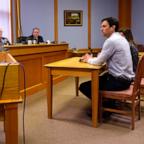Hurricane Naming Is Cyclical Process
July 26, 2004 -- As late summer drags toward fall, unlucky East Coast residents occasionally host guests with names like Arlene, or Bonnie, or Earl who rip the roofs from their homes, soak their property with thousands of gallons of water and leave destruction in their wake. It's not a house party, and the guests are obviously not humans. So who gives hurricanes those goofy people names anyway?
Every year, the National Hurricane Center releases a list of potential hurricane names for the upcoming Atlantic hurricane season. It's an eclectic mix of short, distinctive names designed to be easily pronounced and culturally sensitive.
"The names can't be offensive to other countries, and they're supposed to be short so they're not likely to get garbled in a newscast," said Frank Lepore of the National Hurricane Center.
The initial idea behind naming hurricanes came about in the 1950s as a means of streamlining an older system that used numeric latitude and longitude designations to identify storms. The new system was intended to ease communication issues with the clunky numeric names, and initially storms in the United States were given female names only.
Going Global
In 1978, the naming system went global when a pattern for naming storms was established by the World Meteorological Organization, a division of the United Nations. The WMO divided the world into six regions based on geographic areas that typically share weather patterns, and each region devised its own naming rules.
The United States was placed in Regional Association IV, which includes 25 nations in North America, the Caribbean and South America. The member countries created a six-year supply of names that has been used ever since.
The names were put into six alphabetical lists that alternate male and female names to prevent gender bias, and the lists were put into use on a rotating basis. Every six years a list is repeated, so the 2004 list of names, beginning with Alex and ending with Walter, will be used again in 2010.




